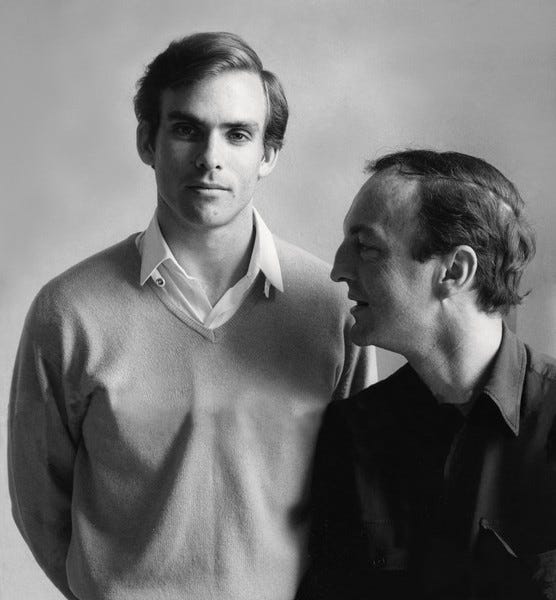TALES OF LOHR: TERRACE MARTIN & KENYON DIXON'S "COME AS YOU ARE"
A dynamic duo serves up smooth south LA sounds; plus, "Factory Roll Call" brings you an extraordinary Joe
Last week’s Audio Edition of this newsletter featured my memories of some standout arts-appreciation experiences from my decade-plus as a resident of Los Angeles. Naturally, I always knew I wouldn’t be able to fit eleven years’ worth of outstanding live music, films, art, and literature into one half-hour-long piece of audio, but even with my full knowledge of the limitations I faced going in, there are still a few singularly distinctive moments of profound and powerful creativity that I regret not having mentioned in “My Angels.” Among those is a thrilling free concert I attended on May 19, 2016 at the Baldwin Hills Crenshaw Plaza, a south LA shopping mall that also functions as a sort of large-scale community center. The concert in question was in honor of the anniversary of Miles Davis’ 90th birthday, and brought together a pair of musical minds who had both made significant contributions to a then-recent piece of major art spawned from the same streets where the shopping center stands: Kendrick Lamar’s monumental, jazz-inflected modern hip-hop classic To Pimp a Butterfly. One of those performers was Robert Glasper, the Houston-born genre-fluid keyboard virtuoso whose piano graces several of Butterfly’s most significant tracks.* The other, less well known to me at the time but arguably even more crucial to Butterfly’s aesthetic success, was Terrace Martin, a native of the area like Lamar, whose skills as a producer and multi-instrumentalist have cemented him as one of the architects of a particularly electrifying strain of south-LA-based Black music, one that brings together jazz, soul, funk, ambient, and hip-hop into a socially engaged, forcefully positive, frequently rapturous melange.
Martin, who spent most of the Miles birthday concert ripping it up in high style on the alto saxophone, has continued to cement the Crenshaw District-adjacent vibe as a vital force in contemporary popular music. He has extended his collaborations with Glasper and Lamar, and has also performed alongside and produced everyone from Busta Rhymes and Wiz Khalifa to Charlie Wilson, Lalah Hathaway, and fellow Angelenos (and Butterfly performers) Kamasi Washington and Thundercat. Martin’s label Sounds of Crenshaw prides itself on providing “a home for the music of Los Angeles,” and his efforts to date have garnered him six Grammy nominations, half of which have come for albums released under his own name.
Martin’s latest Sounds of Crenshaw release finds him joining forces with a fellow Grammy nominee and another exemplar of that up-to-the-millisecond LA sound, Watts-born-and-raised vocalist Kenyon Dixon. Their LP Come As You Are, a co-release with EMPIRE, is just over 35 minutes of sinuous, muscular contemporary soul, seasoned with touches of hip-hop mic work and percussion, and drawing from the evergreen gospel influences that have proven a fruitful tributary for generations of Black American music. Martin’s production brilliance, combined with his instrumental skills and Dixon’s husky yet peerlessly tender voice, result in a sleek, elegant, enveloping listen that is absolutely tailor-made for top-down summer-night cruising, quiet-storm seductive interludes, or simply kicking back, perhaps with your favorite libation or a fine Havana stick, and savoring the nonpareil groove these two artists have conjured. It’s an effortlessly enjoyable sonic experience, and my favorite 2025 album release to date.
Come As You Are kicks off on a note of charm and warmth, the short, sweet “Isley’s Hymn” intermingling Martin’s breathy saxophone with the paired voices of Dixon and his daughter Isley-Rose (also credited here as co-composer). The purity and affection in the sounds of parent and child, entreating us with words of welcome (“Don’t hide your story / Don’t hide your scars”), instantly compels the attention and engagement…which brilliantly sets us up for the downshift into the groovy sample-driven urban tension of “Only Real Ones Survive.” The blend of Martin’s anxious undercurrents with a Dixon vocal that evokes the wary defiance of Marvin Gaye’s “Inner City Blues (Make We Wanna Holler)” vividly illustrates the artists’ intentions to harness every aspect, high and low, of striving and surviving in an alternately glorious and punishing megalopolis like Los Angeles. That high and tight groove carries through into “211,” powered by keening Martin keyboards that wed the track to the stark, somewhat eerie throwback sonic textures that propelled Dr. Dre’s timeless beats for N.W.A. and his own early solo efforts. A much sunnier coastal vibe permeates “Tyrese” (named in honor of vocalist / actor Tyrese Gibson, another LA native). Dixon nimbly navigates the rises and falls of this tune’s melodic line as he weaves a quietly cautionary tale of a man who has everything except the one who got away; Martin’s equally diaphanous yet insinuating keyboard lines offer a sweet counterpoint to the vocals.
Dixon is often at his best here when the tracks allow him to lean into his voice’s considerable erotic energy. Nowhere is this plainer than on the album’s finest cut, “Body & Soul,” which shares a title with an old-school love ballad but packs a steamy potency all its own, Dixon’s multi-tracked sighs and whispers undulating over a dense Martin backing track almost delirious with deadly earnest desire. A more innocent glow permeates “Love Yourself,” a paean to romantic fulfillment through self-betterment glistening with sunbeam keyboards and punctuated by Charlie Bereal’s assertive guitar. Bereal is also a galvanizing presence on the title track, Martin’s keys taking an almost subliminal supporting role as the guitarist and a coolly classy Dixon offer a masterclass in understated R&B sophistication.
True to form, Martin has marshaled an array of standout guest talents to bring their own unparalleled artistry to Come As You Are. Keyon Harrold, whose trumpet doubled for Davis’ on the Glasper-produced soundtrack for the 2016 Don Cheadle film Miles Ahead, billows gracefully forth amidst the island-haze nightscape of “See You Later,” on which Dixon is at his most smoky-smooth seductive. Harrold is likewise appropriately authoritative stabbing through the hard-edged drums of “OUCH,” the album’s nastiest track, with lyrics of almost brutal desperation (“She cut me deep / Like razor’s edge / Ready to jump / I’m on the ledge”). The cool-bumpin’ “WeMaj” serves up a thrilling guest verse from Rapsody, name-checking Roberta Flack and Stevie Wonder as she rides edgy, knowing vibes and keyboards. Vocalist Ogi proves an ideal match for an especially sensitive Dixon and Bereal’s six soothing strings on “Follow Me,” a track that’s only missing the roaring fire and the bearskin rug. And Glasper is back in the house and at the acoustic piano for “Circle of Love”; his timeless sound bracingly backs the tumble and churn of Dixon and the backing vocalists as they call to mind the cycles of affection and devotion that have seen us through. Martin’s alto horn, ardent and stinging, is the ideal icing on this cake.
Come As You Are, which features as its cover photo Martin and Dixon standing together on the steps of a red-doored church, brings us back to the spiritual plane for the closing track, “Not Like That.” Synthed-out Zapp & Roger-style vocals pose the plangent question “When will Jesus return?” before dropping back behind Dixon’s plea for understanding and connection that ideally encapsulates the entire thesis of this album. Terrace Martin and Kenyon Dixon have melded their strengths to coax forth music that engages, in a wholly unpretentious yet intuitively intelligent way, with the sum total of human emotion: The capacity for danger; the sexual fervor; the playful sincerity of feeling; the ultimate yearning for something higher. This is by no means a concept album or a programmatic philosophical treatise in sound. But, in its careful construction, lyrical forthrightness, and overall atmospheric affect, it is as coherent and fully fleshed out a recording as I’ve had the pleasure to experience in some time. Terrace Martin is a musical creator who simply moves from strength to strength, and Come As You Are is as rewarding and inspiring a release as I’ve seen him attach to his name. I don’t know if I’ll ever be lucky enough to see him play live for free again, but given the chance, I would gladly drop more than a few dollars to enjoy this music in person. Here’s hoping if I do, Kenyon Dixon will be there as well. Both of these men came as they are on this album. And what they are is a pair of modern masters of Black music.
* This evening is the second night of Robert Glasper’s two-day stand at Pittsburgh’s City Winery, the same venue where, just last month, I saw The Kids in the Hall’s Scott Thompson perform live as his iconic character Buddy Cole. Glasper performs at 6 p.m. and again at 9 p.m. tonight; to learn more or to purchase tickets, visit the City Winery website.
FACTORY ROLL CALL
JOE LESUEUR (1924 - 2001)
Raised in Los Angeles in the Mormon Church, Joe LeSueur moved to New York City following his graduation from USC, which he attended on the GI Bill after serving in World War II. At a party in 1951, he met poet, critic, and Museum of Modern Art curator Frank O’Hara, and the two embarked on a relationship that would last for almost fifteen years. Given both O’Hara’s and LeSueur’s own connections to the wider art and literary communities of New York City, it was all but inevitable that LeSueur, himself a gifted writer and poet, would make his way into the extended social family of Andy Warhol.
LeSueur appears in two reels of Warhol’s film Couch (1964), chowing down on bananas in the company of Gerard Malanga, Ivy Nicholson, and John Palmer. He also sat for a Screen Test shot the same day as his Couch footage, cutting a notably dour figure readily apparently in the screen capture seen above. But what could have been LeSueur’s greatest contribution to Warhol’s oeuvre never saw fruition. The writer and the Pop artist discussed at length, and began active development on, a film project to be entitled Messy Lives. The concept, devised by LeSueur, was for a series of a dozen interconnected short films, each featuring the same basic cast of characters, but all penned by different screenwriters. LeSueur enlisted a number of the poets of his acquaintance to write dialogue for the 12 planned scenarios, including Ron Padgett, Diane di Prima, Edwin Denby, and O’Hara. Large sections of Denby and Padgett’s sequences made it to the screenplay stage, and O’Hara collaborated with Frank Lima on a piece intended for the film; it was later published, under the title “Love on the Hoof,” in O’Hara’s play collection Amorous Nightmares of Delay. But LeSueur soon acquired a full-time job that pulled his focus away from the film, and Messy Lives was ultimately never shot. LeSueur maintains that, at the end of the day, he was not really sure how serious Warhol had ever actually been about the project in the first place.
LeSueur joked that Messy Lives would have been a perfectly apt title to characterize his own strained relationship with O’Hara at the time of his Warhol film appearances. They finally ended things in 1965, though the two men remained friendly until O’Hara’s death in a car accident the following year. LeSueur went on to enjoy a substantial writing career of his own, in a variety of milieux. He published reviews in The Village Voice, including coverage of several stage plays by frequent Warhol screenwriter Ronald Tavel. He also served as a writer for several prominent television soap operas, including Guiding Light, Another World, and Ryan’s Hope.
Joe LeSueur passed away in 2001, two years before the posthumous publication of Digressions on Some Poems by Frank O’Hara, a combination LeSueur memoir and O’Hara poetry anthology. The book, perhaps inevitably for a writer who made a living in soaps, is described in the Warhol Screen Tests catalogue raisonné entry on LeSueur as “gossipy.”








